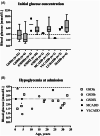A generic emergency protocol for patients with inborn errors of metabolism causing fasting intolerance: A retrospective, single-center study and the generation of www.emergencyprotocol.net
- PMID: 33844307
- PMCID: PMC8518720
- DOI: 10.1002/jimd.12386
A generic emergency protocol for patients with inborn errors of metabolism causing fasting intolerance: A retrospective, single-center study and the generation of www.emergencyprotocol.net
Abstract
Patients with inborn errors of metabolism causing fasting intolerance can experience acute metabolic decompensations. Long-term data on outcomes using emergency letters are lacking. This is a retrospective, observational, single-center study of the use of emergency letters based on a generic emergency protocol in patients with hepatic glycogen storage diseases (GSD) or fatty acid oxidation disorders (FAOD). Data on hospital admissions, initial laboratory results, and serious adverse events were collected. Subsequently, the website www.emergencyprotocol.net was generated in the context of the CONNECT MetabERN eHealth project following multiple meetings, protocol revisions, and translations. Representing 470 emergency protocol years, 127 hospital admissions were documented in 54/128 (42%) patients who made use of emergency letters generated based on the generic emergency protocol. Hypoglycemia (here defined as glucose concentration < 3.9 mmol/L) was reported in only 15% of hospital admissions and was uncommon in patients with ketotic GSD and patients with FAOD aged >5 years. Convulsions, coma, or death was not documented. By providing basic information, emergency letters for individual patients with hepatic GSD or the main FAOD can be generated at www.emergencyprotocol.net, in nine different languages. Generic emergency protocols are safe and easy for home management by the caregivers and the first hour in-hospital management to prevent metabolic emergencies in patients with hepatic GSD and medium-chain Acyl CoA dehydrogenase deficiency. The website www.emergencyprotocol.net is designed to support families and healthcare providers to generate personalized emergency letters for patients with hepatic GSD and the main FAOD.
Keywords: eHealth; emergency treatment; fatty acid oxidation disorders; glycogen storage diseases; hypoglycemia; telemedicine.
© 2021 The Authors. Journal of Inherited Metabolic Disease published by John Wiley & Sons Ltd on behalf of SSIEM.
Conflict of interest statement
The authors declare no potential conflict of interest.
Figures


References
-
- Grunewald S, Davison J, Martinelli D, Duran M, Dionisi‐Vici C. Emergency diagnostic procedures and emergency treatment. In: Blau N, Duran M, Gibson K, Dionisi‐Vici C, eds. Physician's Guide to the Diagnosis, Treatment, and Follow‐Up of Inherited Metabolic Diseases. Berlin Heidelberg: Springer‐Verlag; 2014:709.
-
- Prietsch V, Lindner M, Zschocke J, Nyhan W, Hoffmann G. Emergency management of inherited metabolic disorders. J Inherit Metab Dis. 2002;25:531‐546. - PubMed
-
- Van Hove JLK, Myers S, Vande KK, Freehauf C, Bernstein L. Acute nutrition management in the prevention of metabolic illness: a practical approach with glucose polymers. Mol Genet Metab. 2009;97(1):1‐3. - PubMed
-
- Rodan LH, Aldubayan SH, Berry GT, Levy HL. Acute illness protocol for urea cycle disorders. Pediatr Emerg Care. 2018;34(6):e115‐e119. - PubMed
Publication types
MeSH terms
Substances
LinkOut - more resources
Full Text Sources
Other Literature Sources
Medical

